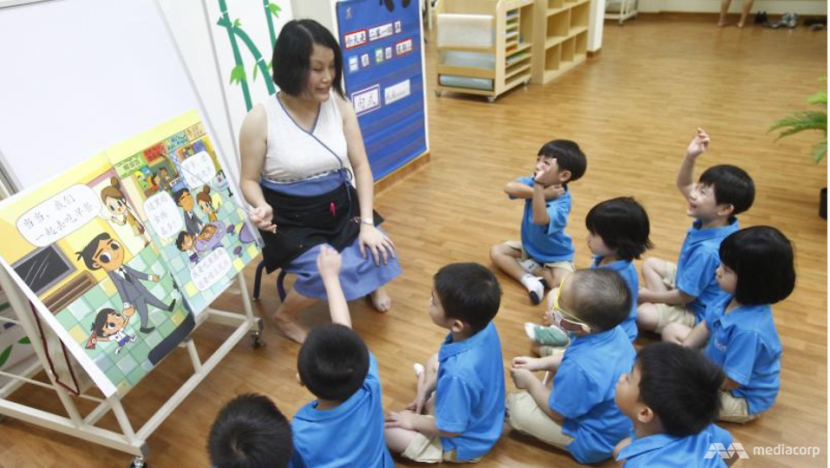7 pre-schools to have in-school support for children with developmental needs

An early childhood educator with her students. (File Photo: TODAY)
SINGAPORE: The Early Childhood Development Agency (ECDA) will roll out measures to enhance inclusion and support for children with developmental needs, including the pilot for an Inclusive Support Programme (InSP).
Some children with developmental needs travel from pre-school in the morning to the Early Intervention Programme for Infants and Children (EIPIC) centre in the afternoon, said Minister of State for Social and Family Development Sun Xueling on Friday (Apr 30) on the sidelines of her visit to a My First Skool centre.
"They can face (the) inconvenience of having to shuttle between the two different centres," she said.
Ms Sun added that InSP would ensure in-school support for children who require medium levels of early intervention support at their pre-schools. Such support would include pull-out programmes, where a child is taken out for customised sessions, and in-classroom support.
The ministry will announce the pilot sites in the second half of the year, and start the first pilot towards the end of this year. In all, MSF will launch seven pilots, with the last one operational by 2022.
The InSP was one of seven key recommendations put forth by the Inclusive Pre-school Workgroup on Friday to allow children with developmental needs to "learn, play, contribute and participate meaningfully alongside their typically developing peers in pre-schools and the community", said ECDA in Friday's media release.
The InSP was first announced in March, during MSF's Committee of Supply debate. Other initiatives introduced in March included appointing Inclusion Coordinators at every pre-school and expanding the Development Support - Learning Support and Development Support Plus programmes to more pre-schools.
READ: All pre-schools to have inclusion coordinator to identify and support children with developmental needs
READ: Love, unconditionally: Life as a mum raising 3 children with special needs
INCLUSIVE SUPPORT PROGRAMME
Under the InSP pilot, the selected pre-schools will have full-time early intervention professionals and visiting allied health professionals providing specialist support to children who require medium levels of early intervention support.
These children will have an Individualised Programme Plan comprising in-class support and pull-out sessions.
Early intervention professionals and early childhood educators will plan and teach classes together. With differentiated teaching practices, they can tailor lessons to the children's learning abilities.
Most children in InSP pre-schools will be typically developing children, to ensure that typically developing children lead classroom dynamics while catering to children with developmental needs.
READ: Little tweaks, with a big difference: The value proposition of inclusive pre-schools
READ: MSF to enhance early intervention framework; more support for children with developmental needs
InSP pre-schools will plan activities that encourage "meaningful interactions" among children, and they will modify the pre-school environment for children with development needs, where necessary and viable, said ECDA.
Parents and caregivers will also be "actively and regularly involved" in their child's progress and development.
CERTIFICATE IN INCLUSIVE PRACTICE
To train early childhood educators to support children with developmental needs, ECDA and the National Institute of Early Childhood Development will introduce a 120-hour Certificate in Inclusive Practice in June.
For instance, educators will learn about two types of classroom practices, said Ms Sun.
In pull-out sessions, teachers can draw the child out to provide more customised teaching before introducing them back to their original class, so that the child "will not experience too much dislocation".
READ: More support in pre-schools for children with developmental needs
Otherwise, pre-schools could have a dedicated teacher sitting with the child in the class and facilitate "better interaction" between the child and other children in class.
"These differentiated teaching methods can actually benefit both typically developing children as well as children with developmental needs," said Ms Sun.
OTHER INITIATIVES
Following the workgroup's recommendations, ECDA and the Ministry of Education released a set of professional practice guidelines for pre-school-aged children in February.
The guidelines aim to help professionals support children and their families better and ensure a "smooth transition" beyond pre-school, said ECDA.
Now, the agency is looking towards publishing a parents' version of the guide. It will also work with SG Enable to improve the Enabling Guide, which provides information and advice on schemes, services, support and resources related to disability in Singapore.
In addition, the Ministry of Health has extended subsidies to eligible Singaporeans to receive childhood developmental screening at all Community Health Assist Scheme (CHAS) general practitioner clinics and polyclinics.












